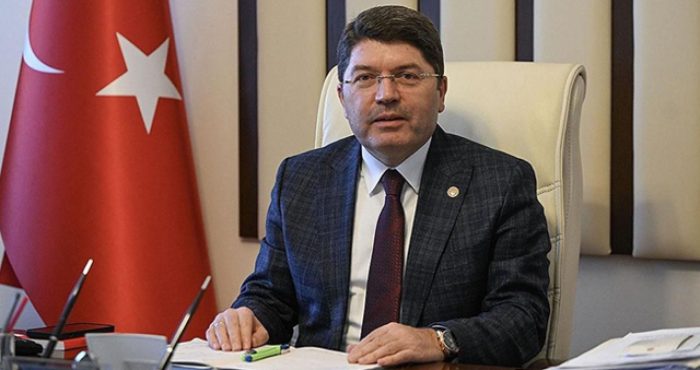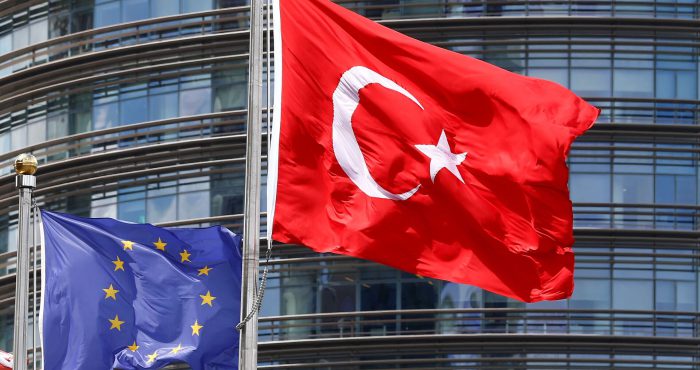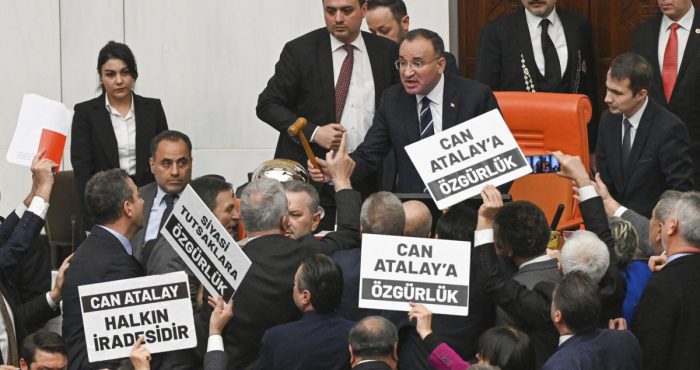Our hopes of rescuing those trapped under the rubble of the February 6, 2023, Kahramanmaraş earthquake are dwindling further and further with each passing day. As the news comes through of miraculous rescues from under the debris, we burst into tears. The whole nation is grieving over the news that the death toll has exceeded 35,000. Nearly five times as many have been injured, and a significant portion of the building stock in the region has been destroyed or damaged and has become unusable.
We must quickly solve the problems of electricity, water, heating, communication, transportation, general health, security and more, and bring life back to normal within and beyond the region. We must continue our aid and frantic efforts until the people recover and the wounds are fully healed.
Population and voter registers must be updated quickly
The address-based population registers of the 200,000 people who have been moved out of the region and approximately 1 million people who have migrated out of the region, and the voter registers produced from these registers, must be rapidly updated via AFAD (the Disaster and Emergency Management Presidency). These updates are essential before the next elections on June 18. The elections cannot be held before or after that date for de facto and de jure reasons that I explained in my previous article; on the exact day, under normal conditions, Türkiye must elect its rulers for the next period.
After meticulously identifying and rescuing the survivors, the judiciary, which has acted ex officio, should identify and secure the evidence in the rubble as soon as possible with the help of volunteer bar associations, lawyers and engineer experts. After the judiciary has fulfilled its duty, we should start to remove the rubble, build better and safer cities in safe places, and work to minimize the social and economic damages caused by the destruction. Furthermore, we must rebuild the richness of tolerance and culture in Antakya, which is particularly important in Türkiye’s national security.
We need to learn lessons for future earthquakes
But this is not enough. We need to be better prepared for the forthcoming Istanbul earthquake and other earthquakes, known to be of similar magnitude but whose date is unpredictable, by learning lessons from the Kahramanmaraş earthquake.
Which faults in Marmara will break and to what length, and the fact that there will be a major earthquake as a result, is certain, but the timing of when this will happen is unknown. However, the extent of the destruction it may cause and the measures that should be taken to prevent destruction are known. How an earthquake will affect the population when it occurs and what needs to be done to minimize its effects are factors that we can predict.
Istanbul by itself, which is at least three times the size of the Kahramanmaraş earthquake zone, is home to 20% of Türkiye’s population and generates 45% of our national income. Istanbul is our country’s intellectual, economic and social backbone. Therefore, any damage to Istanbul is closely related to the survival of our country. Any devastation in the area likely to be affected by the Istanbul earthquake will have the same impact as the destruction of almost the entire country.
In the anticipated major Istanbul earthquake, we do not have the luxury of experiencing the problems and setbacks we experienced in the Kahramanmaraş earthquake again.
We were late in Kahramanmaraş
Scientists had predicted in advance that there would be an earthquake on February 6, 2023, at 4:17 am, and its magnitude. Even at the moment of the earthquake, it was clear that there would be massive destruction in the region. However, the government failed to take immediate action, to immediately determine the extent of the destruction, to inform the public about the damage and needs, to coordinate and control rescue and relief efforts, to deliver aid effectively and quickly to the places of need, to distribute it to those in need, and in many other ways.
Some areas had significant disruptions to transportation, communication, health and security. In addition, unacceptable delays and disruptions emerged in response to the disaster and in search-and-rescue efforts, as there was a lack of coordination between different government departments and some of the first responders were themselves victims of the earthquake. These issues appear to have been more severe than President Recep Tayyip Erdoğan acknowledged. For example, the state of emergency was declared only 45 hours after the earthquake when it should have been declared within one or two hours.
The Istanbul earthquake must be the priority now
While healing the wounds of the Kahramanmaraş earthquake, our priority should be to learn lessons from this earthquake and to be well prepared for the great Istanbul earthquake just around the corner. For this, we must act with wisdom, and, at the very least, efforts must be made rapidly on the following issues:
- All of the problems experienced during the February 6 earthquake should be documented, including the lack of inter-institutional coordination and command, damage and needs assessment, supply of relief forces, heavy machinery and materials (logistics). The actions necessary to prevent these or similar problems from occurring should be studied in detail.
- In the February 6 earthquake, it is estimated that the Anatolian plate slipped approximately 3 to 6 meters to the west, producing further earthquakes. Therefore, a scientific committee consisting of national and international experts on the subject should be established immediately, the effects of the Kahramanmaraş quake on the expected Istanbul earthquake should be investigated using the most advanced means and discussed, and measures should be taken according to the findings and recommendations of the committee.
Learning from drills
- For the Istanbul earthquake, scientists predict two magnitude possibilities depending on whether the fault line breaks entirely or partially. Disaster scenarios should be created according to these two possibilities, and drills and simulations should be carried out as if these possibilities were real, as in the military. In these drills, all the experiences of the February 6 earthquake should be accepted as if they were real for Istanbul, and the drills should be carried out accordingly.
- Prior to these drills and afterwards, based on the experience of the drills, the responsibilities of each institution that will be in charge in the great Istanbul earthquake, the responsibilities of their officials, and their authorities during and after the earthquake should be clearly defined. Their rights and framework for taking the initiative should be drawn up, and an activity and management order in which institutions and individuals will coordinate even if they have to act on their own should be established. It is clear that although drills had been carried out around Kahramanmaraş in anticipation of an earthquake, no lessons were learned.
Civil society and public cooperation
- The rescue and relief activities of civil society should never be impeded. However, considering the immediate mobilization of civil society, the framework of these activities and the information and reporting principles for coordination should be clearly defined. Non-governmental organizations and individual volunteers should be organized in advance by identifying the duty locations, their tasks and other team members. Assignments should be made in advance, with at least three people for each task, and the necessary information and documents should be drafted and delivered to them in advance. Regardless of whether they are official or civilian, the authorities, legal capabilities and responsibilities of all involved should be clearly defined. These issues should be compiled and collected in a single regulation, and their outlines should be included in the authorization documents.
- Preliminary arrangements should be made for national and international briefings, for the collection and management of aid from abroad, and for bringing such aid to Türkiye and managing it with transparency and accountability in accordance with its purpose.
- These preparations should be refreshed at meaningful intervals and updated as needed.
Nations learn through bitter experience
Another important lesson to be learned from the experiences of the Kahramanmaraş earthquake is that state institutions such as AFAD should be made fully politically neutral, embraced and trusted by all segments of society. More importantly, the Red Crescent, which has a high reputation in Türkiye and around the world, should be restructured to operate free of political influence and partisanship.
The activities of the Red Crescent and similar publicly recognized organizations, their financing, resources, shortcomings, how they prepare for disasters by collecting aid, and where the aid is spent should be made fully transparent and accountable, audited and reported to the public so that such organizations can regain the trust of both the public and the international community.
Thus, these institutions should be able to respond to national and international disasters, mobilize aid resources all over the world, organize volunteers and their work, and achieve the highest success in disasters.
There can be no state officials against the people, despite the people
We saw it in the 1999 Marmara earthquake, and we see it also in the 2023 Kahramanmaraş earthquake: no power can overcome the willingness and determination to help in disasters and catastrophes of the Turkish nation, which has such a high solidarity drive and is so quick and willing to take action.
Both state institutions and rulers should be aware that they derive their legitimacy and power from the nation, and they should abandon the mentality that sees the state as a separate entity from the nation and themselves as its owners. The rulers, especially the President of the Republic, must stop sanctifying the state institutions and their offices and abandon the desire to make the nation obey the authorities and themselves. Instead, it should be inscribed in the minds of the rulers and in the most visible places of all state structures that state institutions and rulers are the servants of the nation.
Is a ministry of disasters or earthquakes the solution?
Instead of taking token measures, such as establishing a disaster or earthquake ministry, which would simply refer the problem to another person and sweep it under the rug, an institution should be established to ensure coordination of immediate and rapid action in disaster management, all state institutions and civil society when disaster occur, and civilians should be active in its management. The driving force of this institution should be civil society organizations, and all segments should be represented, work effectively and participate in decisions, but state institutions should not be the decision-makers. The institution’s executives should be selected through open competition based on merit and from among those with equal competence.
With the shame of being a member of a society that could not prevent the destruction and losses that could have been prevented in the 2023 Kahramanmaraş earthquake and other past earthquakes, I wish mercy to those who died and patience and resilience to those who survived.




